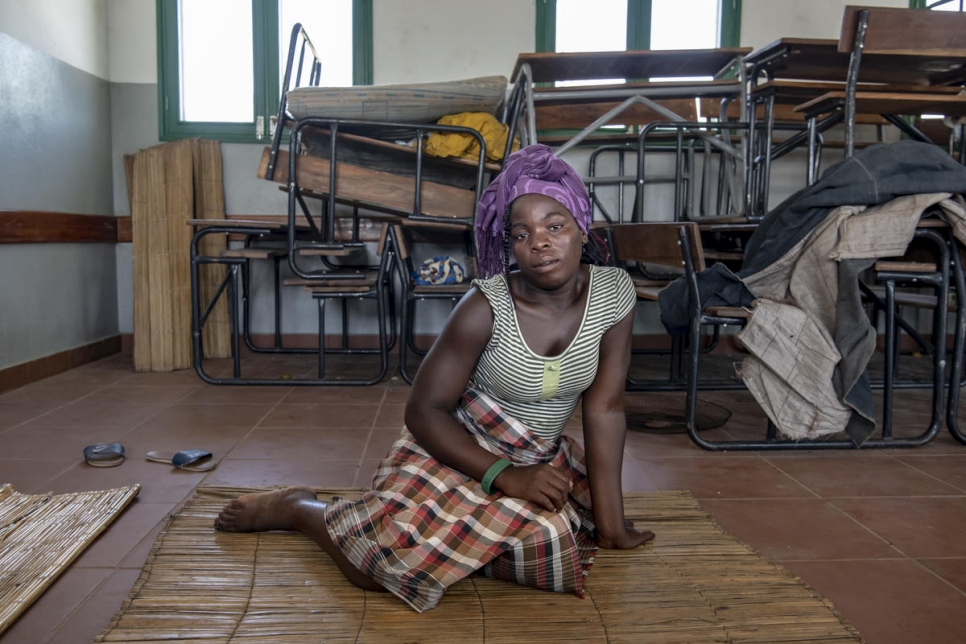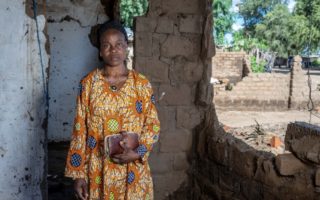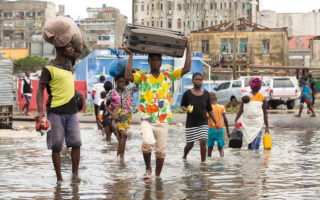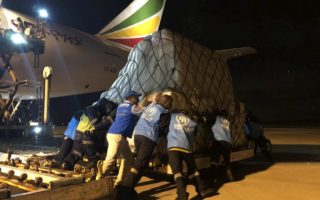
Francesca Raoul, 26, sits on a mat in a classroom where she has slept since her home in Dondo, Mozambique was destroyed in Cyclone Idai. © UNHCR/Alissa Everett
An aircraft carrying tents, tarpaulins, mosquito nets, solar lanterns and other vital relief lands in Mozambique to support 10,000 survivors.
By Peter Holmes à Court
DONDO, Mozambique – After Cyclone Idai tore through her village in Mozambique, destroying scores of homes, Francesca Raoul and her daughter sought shelter in one of the few structures left standing: the local high school.
The 26-year-old mother and her daughter are now among more than 200 families who have found shelter in the school in Dondo, a small town 30 kilometres inland from the coastal city of Beira.
Together with 10 to 20 other families – all of whom lost their homes and most of their possessions to the storm – they squeeze into a classroom at night, sleeping side by side. Francesca is in desperate need of the most basic necessities to restart life.
“I hope for a tent because I don’t feel safe sleeping in a group,” she said. “I lost my kitchen too so some food would be good, but I need to cook it.”
Others share her plight. Mikirina Perez, 27, a single mother of four, described how little has been available since the storm ripped through the community on the night of 14–15 March. She too sleeps in the school with her children.
“I have only received one cup of maize flour a day for my family.”
“I have only received one cup of maize flour a day for my family,” she explained as she looked at her two-year-old boy, whose belly looked distended in an ominous sign of malnutrition.
Mikirina and Francesca joined other women earlier that morning to put their names down on a distribution list for relief items. However, they missed out as there were too many families and too few items to distribute.
“It’s very upsetting because things are getting harder as each day passes,” said Francesca.
When the cyclone churned through the area, it destroyed tens of thousands of homes and floods spoiled most food reserves. Prices of whatever little remained in the markets have spiraled beyond reach.
The traumatic events of the night the cyclone hit are still fresh.
Ginoka Phillipa, 30, described the sound of the wind as it grew stronger until it blew the roof of her house off.
“I fled with my husband and two boys to a neighbour’s house,” she explains. “But when I returned, all the walls had collapsed.”
She was able to collect a few kitchen pots, some food items and some wet clothes and made her way to the high school which now provides temporary shelter.
With electricity poles down, local businesses have no power and there is limited road access to allow trade. The markets in the area have shrunk and people are desperate.
Help is now at hand. Relief items from UNHCR, the UN Refugee Agency, arrived today in Mozambique, to help thousands of people affected by Cyclone Idai.
The aid was flown into the capital, Maputo, from UNHCR’s global stockpiles in Dubai. It includes family tents, plastic tarpaulins, sleeping mats, blankets, mosquito nets, solar lanterns, cooking sets, jerry cans and other relief items.
Valentin Tapsoba, UNHCR Director for Southern Africa, is in Mozambique to oversee relief operations and reiterated support for those like Francesca and Mikirina affected by the storm.
“We are here to show solidarity and compassion for the people. They are not alone, UNHCR is here to support them,” he said.
He added that the relief items would be immediately dispatched to support 10,000 people in the port town of Beira – and surrounding areas – which were hardest hit by the cyclone.
“Houses and livelihoods have been destroyed and people are staying in churches, in schools, in public buildings.”
“The situation in Beira is of dire need,” he explained. “Houses and livelihoods have been destroyed and people are staying in churches, in schools, in public buildings.”
“The survivors of this devastating disaster need assistance,” said Tapsoba. “This is unprecedented. We have never seen anything like this.”
He added that more international support is needed to ensure all the affected people get help urgently.
Local support has built momentum as most of the volunteers distributing relief items provided by the local authorities are Mozambican nationals.
For Francesca, Mikirina and Ginoka, the arrival of UNHCR’s aid will be of some relief.
UNHCR has scheduled two other flights to arrive in the other affected regions in Zimbabwe and Malawi this week.
Additional reporting by UNHCR staff in Maputo, Mozambique
HELP CYCLONE AFFECTED REFUGEES NOW
Originally published by UNHCR on 27 March 2019





